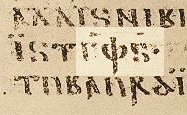The New Testament (NT) is the second division of the Christian biblical canon. It discusses the teachings and person of Jesus, as well as events relating to first-century Christianity. The New Testament's background, the first division of the Christian Bible, is called the Old Testament, which is based primarily upon the Hebrew Bible; together they are regarded as Sacred Scripture by Christians.

The Christian doctrine of the Trinity is the central doctrine concerning the nature of God in most Christian churches, which defines one God existing in three, coeternal, consubstantial divine persons: God the Father, God the Son and God the Holy Spirit, three distinct persons (hypostases) sharing one essence/substance/nature (homoousion).

The New World Translation of the Holy Scriptures is a translation of the Bible published by the Watch Tower Bible and Tract Society; it is used and distributed by Jehovah's Witnesses. The New Testament portion was released first, in 1950, as the New World Translation of the Christian Greek Scriptures, with the complete New World Translation of the Bible released in 1961.
Biblical inerrancy is the belief that the Bible "is without error or fault in all its teaching"; or, at least, that "Scripture in the original manuscripts does not affirm anything that is contrary to fact".
An Historical Account of Two Notable Corruptions of Scripture is a dissertation by the English mathematician and scholar Isaac Newton. This was sent in a letter to John Locke on 14 November 1690. In fact, Newton may have been in dialogue with Locke about this issue much earlier. While living in France, Locke made a journal entry, dated 20 December 1679, where he indicates that while visiting the library at Saint-Germain-des-Prés he saw:
[T]wo very old manuscripts of the New Testament, the newest of which was, as appeared by the date of it, at least 800 years old, in each of which 1 John, ch.v. ver. 7, was quite wanting, and the end of the eighth verse ran thus, "tres unum sunt;" in another old copy the seventh verse was, but with interlining; in another much more modern copy, ver. 7 was also, but differently from the old copy; and in two other old manuscripts, also, ver. 7 was quite out, but as I remember in all of them the end of the eighth verse was "tres unum sunt."

Matthew 3:11 is the eleventh verse of the third chapter of the Gospel of Matthew in the New Testament. The verse occurs in the section relating the preachings of John the Baptist. In this verse he predicts that he will be followed by someone much greater than himself. The main theme of this verse is that John will soon be supplanted by a much greater figure and that John's water baptism is just a preparation for the much greater baptism with the Holy Spirit and fire.

John 1 is the first chapter in the Gospel of John in the New Testament of the Holy Bible.

Reformed fundamentalism arose in some conservative Presbyterian, Congregationalist, Reformed Anglican, Reformed Baptist, Non-denominational and other Reformed churches, which agree with the motives and aims of broader evangelical Protestant fundamentalism. The movement was historically defined by a repudiation of liberal and modernist theology, the publication (1905–1915) entitled, The Fundamentals, and had the intent to progress and revitalise evangelical Protestantism in predominantly English-speaking Protestant countries, as well as to reform separated churches according to the Bible, historic expression of faith and the principles of the Reformation. The Fundamentalist–Modernist controversy, and the Downgrade controversy, kindled the growth and development of reformed fundamentalism in the United States and the United Kingdom. Reformed fundamentalists have laid greater emphasis on historic confessions of faith, such as the Westminster Confession of Faith.

John 3 is the third chapter of the Gospel of John in the New Testament of the Christian Bible. It deals with Jesus' conversation with Nicodemus, one of the Jewish pharisees, and John the Baptist's continued testimony regarding Jesus. Baptist preacher Charles Spurgeon said of this chapter that it is the one he would choose "to read to a dying man who did not know the gospel, [as] the most suitable one for such an occasion".

John 5 is the fifth chapter of the Gospel of John of the New Testament of the Christian Bible. It relates Jesus' healing and teaching in Jerusalem, and begins to evidence the hostility shown him by the Jewish authorities.
Within Christianity, faith, in one sense, is often discussed in terms of believing God's promises, trusting in his faithfulness, and relying on God's character and faithfulness to act. Some denominations believe in the New Covenant and in the doctrine of salvation by faith alone. According to most Christian traditions and denominations, Christian faith requires a belief in the resurrection of Jesus, and the Agony in the Garden which Jesus states is the plan of God the Father.

Matthew 9 is the ninth chapter of the Gospel of Matthew in the New Testament. It continues the narrative about Jesus' ministry in Galilee as he ministers to the public, working miracles, and going through all the cities and towns of the area, preaching the gospel, and healing every disease. This chapter opens with Jesus back in "his own town", i.e. Capernaum. This chapter reflects "the crucial role of faith" in relation to healing.

The English word god comes from the Old English god, which itself is derived from the Proto-Germanic *gudą. Its cognates in other Germanic languages include guþ, gudis, guð, god, and got.

In Christianity, the Logos is a name or title of Jesus Christ, seen as the pre-existent second person of the Trinity. In the Douay–Rheims, King James, New International, and other versions of the Bible, the first verse of the Gospel of John reads:
In the beginning was the Word, and the Word was with God, and the Word was God.
Matthew 10:36 is a verse in the tenth chapter of the Gospel of Matthew in the New Testament.

John 1:1 is the first verse in the opening chapter of the Gospel of John in the New Testament of the Christian Bible. The traditional and majority translation of this verse reads:
In the beginning was the Word, and the Word was with God, and the Word was God.

The Tyndale Bible (TYN) generally refers to the body of biblical translations by William Tyndale into Early Modern English, made c. 1522–1535. Tyndale's biblical text is credited with being the first Anglophone Biblical translation to work directly from Hebrew and Greek texts, although it relied heavily upon the Latin Vulgate and Luther's German New Testament. Furthermore, it was the first English biblical translation that was mass-produced as a result of new advances in the art of printing.

Sacred Name Bibles are Bible translations that consistently use Hebraic forms of the God of Israel's personal name, instead of its English language translation, in both the Old and New Testaments. Some Bible versions, such as the Jerusalem Bible, employ the name Yahweh, a transliteration of the Hebrew tetragrammaton (YHWH), in the English text of the Old Testament, where traditional English versions have LORD.

In Christian theology, metanoia is often translated as "conversion" or "repentance," though most scholars agree that this second translation does a disservice to the original Greek meaning of metanoia.
In Protestant theology, verbal plenary preservation (VPP) is a doctrine concerning the nature of the Bible. While verbal plenary inspiration (VPI) applies only to the original autographs of the Bible manuscript, VPP views that, "the whole of scripture with all its words even to the jot and tittle is perfectly preserved by God in the apographs without any loss of the original words, prophecies, promises, commandments, doctrines, and truths, not only in the words of salvation, but also the words of history, geography and science; and every book, every chapter, every verse, every word, every syllable, every letter is infallibly preserved by the Lord Himself to the last iota so that the Bible is not only infallible and inerrant in the past, but also infallible and inerrant today ."














